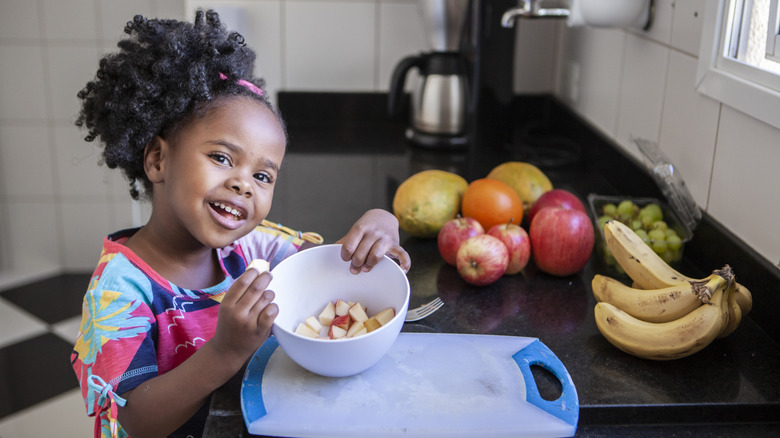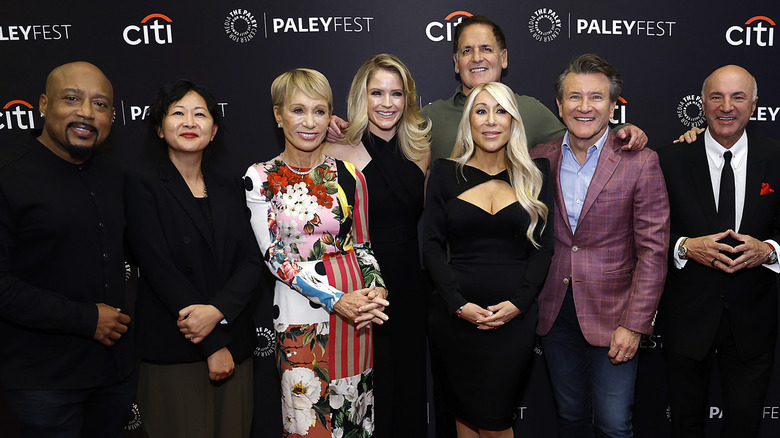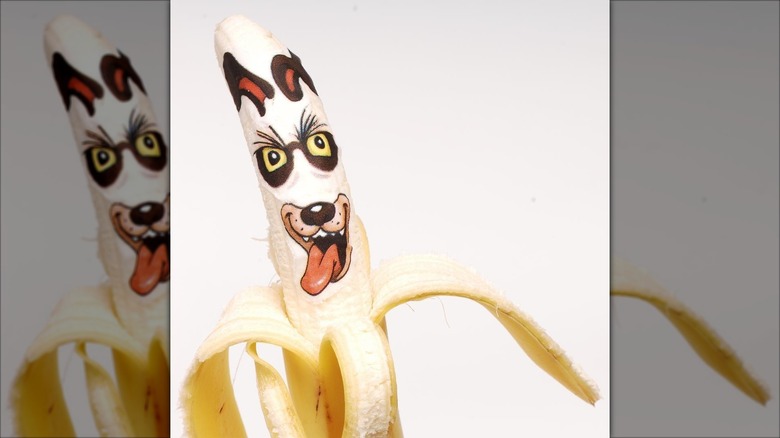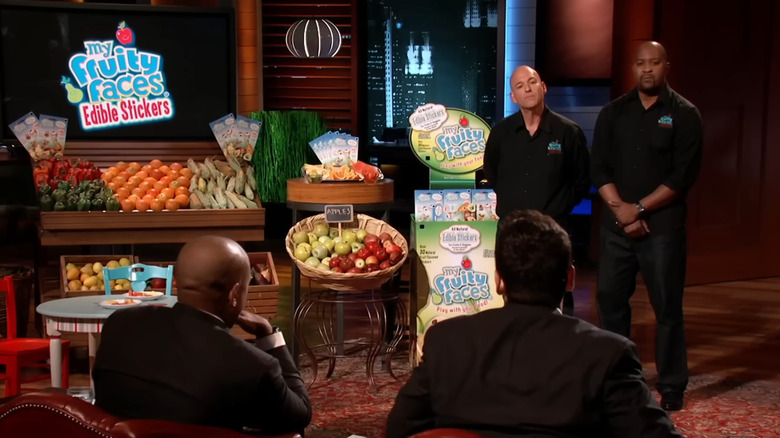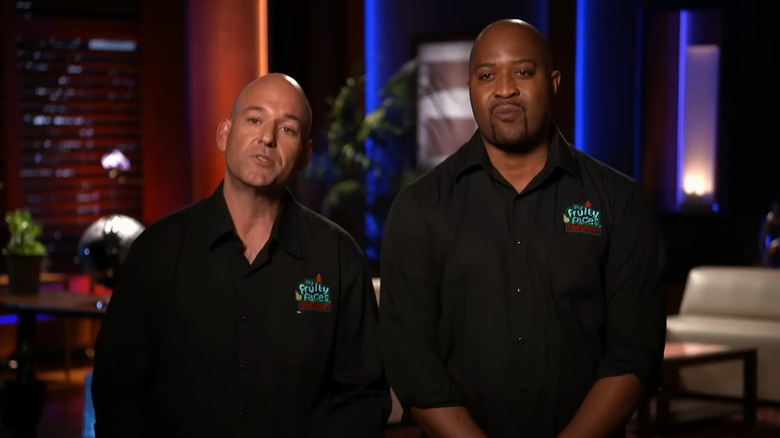My Fruity Faces: Here's What Happened After Shark Tank
With so many processed snacks in eye-catching packaging on the market, it can be a challenge to convince children that fruit is a better choice. As a means of potentially solving that problem, entrepreneurs Adam Gerber and Bob Ntoya created My Fruity Faces. The edible stickers can be adhered to anything from popular summer fruits like watermelon or apricots to something less common like delicious Andean cherimoya, all with the purpose of making fruit more fun and appealing to eat.
Hailing from Altadena, California, the pair appeared on Season 7, Episode 26, on April 29, 2016, to pitch their product to the investors on "Shark Tank." In tow were two little ones, too, who sidled up to a table to snack on fruit adorned with the stickers while Gerber and Ntoya began their planned pitch. The cuteness of the kids noticeably captured the attention of many of the Sharks, but it wasn't enough to distract from Ntoya nervously stumbling through the early part of his speech, making for a rocky start to a request for $200,000 for a 10% investment in the company.
What happened to My Fruity Faces on Shark Tank?
Once Bob Ntoya recovered from the challenging start to the pitch, he and Adam Gerber were able to explain their product and its purpose to the panel that included Barbara Corcoran, Mark Cuban, Daymond John, Kevin O'Leary, and Chris Sacca (Chairman of Lowercase Capital). Gerber also enthusiastically shared, "We use magical ingredients with fruity science to create an all-natural, safe, edible sticker," before handing out samples, which were fairly well-received (per YouTube).
O'Leary initiated the questions by inquiring about the sales of the stickers, to which Gerber responded that they had brought in $125,000 in the first three years, a number that none of the Sharks were excited about. When Ntoya shared that the previous month's earnings were $2,000, the group was even less impressed. Ntoya tried to offset the information by explaining that they were working to get their products into Walmart — but when pressed about the actual arrangement, Ntoya shared that they did not yet have a purchase order, which further disappointed the panel of investors. To add insult to injury, more questioning also revealed that the two had raised $482,000 for the company but were in debt to the tune of $177,000 with only $4,000 in the bank.
Corcoran was the first to decline investing, citing a doubt that she'd see a return. The others followed suit, with O'Leary advising them to avoid sinking anymore money into the company and Sacca noting that an investment would primarily just cover their debts. Both Cuban and John opted out based on what they saw as a poor execution of the business.
My Fruity Faces after Shark Tank
While My Fruity Faces appeared to continue to operate after the "Shark Tank" episode aired, whether or not they got the typical boost in business (known as the "Shark Tank" effect) doesn't appear to be publicized. However, the stickers could be purchased on the company's website and Amazon.
Unlike brands like Copa di Vino that were still successful despite not receiving an investment on "Shark Tank," My Fruity Faces ultimately went out of business. In fact, Adam Gerber's LinkedIn account lists his ending date at My Fruity Faces as February 2016, which is before the episode even aired. Meanwhile, Bob Ntoya's end date on his LinkedIn profile is later — in December of 2017. Finally, the link to My Fruity Faces' Facebook page from Gerber's account is defunct; the last Instagram post for the company was on Halloween of 2017, and its website is non-functional.
Why did My Fruity Faces go out of business?
Similar to the lack of information on My Fruity Face's performance after "Shark Tank," there is little available about what eventually led to the company's closing. However, the financial situation that the Sharks uncovered when Adam Gerber and Bob Ntoya appeared on the show, potentially paired with the lack of strategy that Mark Cuban and Daymond John identified, could have been contributing factors.
Another possibility is that the product was simply not successful for practical reasons. On one Reddit thread, Redditors who watched the show questioned the wisdom of encouraging children to eat stickers, suggesting that it could encourage little ones to attempt to eat non-edible ones. Another post on a separate Reddit thread said, "Maybe I'm being too closed[-]minded, but my immediate thought was[,] 'What a horrible idea, who would want to teach their kids to EAT STICKERS???' I would never buy this product ever."
Meanwhile, on a YouTube post of the pitch, commenters also mentioned the same concerns as Redditors — many suggested these would teach children to eat normal stickers, which is obviously less than ideal. In addition, some noted that they thought the product was a waste of money or would work better in other formats, like in Happy Meals at McDonald's.
What's next for My Fruity Faces' founders?
After their appearances on "Shark Tank," both Adam Gerber and Bob Ntoya have continued to embrace their entrepreneurial spirit. Even prior to his involvement with My Fruity Faces, since 1999, Gerber was a real estate specialist at his firm, Adam Gerber Real Estate Group. In 2017, he also founded I Wanna Green Home, specializing in green energy efficiency. In addition to his own ventures, he is also the V.P. of Acquisitions for Real Estate Heaven, Intl, and works in the capacity of a Comfort Advisor for Lowe's and Home Depot.
Ntoya had also owned another business while operating My Fruity Faces. The company, 3BeCOM, specialized in content marketing strategy and copywriting until 2019 when the company appears to have gone under. Then, in 2019, he founded Medibles, which focuses on CBD products as a bespoke subscription service. Three years later, Ntoya started another organization, Biomed, with a focus on healthcare accessibility and biotechnology. Additionally, in 2017, the entrepreneur began an MBA program at the University of Southern California, where he ultimately earned the degree in 2019.

